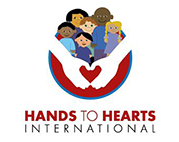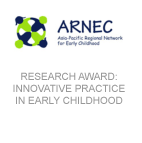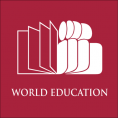HHI Resume
Hands to Hearts International (HHI) improves the health and development of vulnerable children (ages 0-3) globally by training caregivers in early child development and nurturing parenting skills. Founded in Oregon, USA in 2004.
HHI developed a training program that is highly scalable, replicable, cost effective and applicable to a wide array of caregivers (parents, grandparents, foster parents, health workers, traditional birth attendants, day care and orphanage staff). The program is always led by local HHI Certified Community Trainers, who are fluent in their community’s language and culture. These Community Trainers teach caregivers how to improve their ability to nurture their children’s language, social, cognitive and physical development and to best support their health, nutrition and early learning. It also cultivates emotional attachment, establishing the base for all future relationships and a healthy social fabric. By providing quality information on early childhood development, and connecting this to local tools, traditions and practices, HHI offers skills and information that are applicable and meaningful regardless of resources, or even literacy.
Hands to Hearts International collaborates with partner organizations, governments or agencies to provide them the tools and resources to apply within their own systems to improve the early development, health and learning of the most vulnerable children.
Globally over 200 million children under 5 years are not fulfilling their development potential. (Lancet Journal, 2007) HHI offers a simple and pragmatic solution to a global problem.
HHI’s experience and capability to date is as follows:
PAST PERFORMANCE
HAITI
Program Development & Training
2015: Contracted by Alliance for Children Foundation to adapt HHI’s early childhood development training for parents and orphanage caregivers in Haiti. Working together, HHI led its first Training of Trainers in Haiti for 12 women and men, in May 2015. These HHI Trainers are now leading trainings around their communities of Kennescoff and on the island of La Gonave.
INDIA
Training
Orphanages and State Welfare Workers:
- 2006 – 2009: HHI staff trained more than 500 care-givers in 40+ orphanages and foster home settings around Tamil Nadu, Kerala, and Odisha.
- 2007 – 2014: In association with India’s Integrated Child Development Services (ICDS), HHI specialists have trained approximately 4,400 ICDS Anganwadi Workers and Helpers in the states of Tamil Nadu, Kerala, Odisha, and Andra Pradesh.
Community Members and Community Health, Education & Welfare Workers:
- 2013 – HHI partners with HealthPhone to make HHI’s instructional Baby Massage video available to over 2 million rural mothers in Maharashtra. HHI’s video is now watchable on their mobile phones, in 26 different languages, all via HealthPhone’s pre-loaded microSD card.
- 2011 – 2014: In association with India’s National Rural Health Mission, in central Odisha, almost 1,300 Accredited Social Health Activists (ASHAs) have participated in HHI’s training.
- 2007 – 2014: HHI has trained more than 23,000 mothers, grandmothers, crèche workers and other NGO staff in the communities around Tamil Nadu, Kerala, Odisha, Andra Pradesh, Karnataka and New Delhi.
Program Development
- 2012: Contracted by Save the Children India, applied HHI’s methodology to create their first program for children aged newborn – 3 years. In Andra Pradesh HHI trained 17 master trainers at Save the Children in HHI’s ECD Curriculum and in how to train others with this material. These master trainers subsequently trained 292 child care workers within India’s Integrated Child Development Services (ICDS) as well as an additional 6,700 mothers with young children. This sequence of training has ultimately benefited more than 10,000 vulnerable infants.
- 2007: Consulted for Children’s Home Society & Family Services of St. Paul, Minnesota. Designed a Foster Family Program to be based in Chennai, India. Created program planning, operational structure, job descriptions, budget and admission criteria for children with disabilities to have access to foster care rather than orphanages.
UGANDA
Program Development & Training
2009 – 2013. Under the auspices of a USAID Child Survival Grant, Medical Teams International collaborated with HHI to create an Early Childhood Development component to enhance the impacts of the health interventions. HHI adapted our ECD curriculum and program model and trained 14,367 parents/caregivers. Our goals were to raise greater awareness of their child’s health and development, to recognize when their child may be ill or developmentally delayed, and instruct them how to better access health services. Additionally, the ECD training targeted health workers to enable them to be more supportive (less harsh) with parents, while building health workers overall base of knowledge.
Final Evaluation – 2013
To measure impact of the HHI’s ECD (and psycho-social support) intervention, questions were included in the baseline, midterm and final Knowledge, Practice and Coverage surveys to measure household practices. Focus group interviews were also conducted at the same times, with parents, community volunteers and health staff.
Quantitative data collected showed a remarkable increase in key ECD indicators and impressive sustainability even 18 months after the intervention. Highlights include:
- Cognitive stimulation from parent to child increased from 30% – 76%
- Showing affection during feeding (responsive feeding is important to preventing malnutrition) increased from 54% – 91%
- Mothers talking or singing to their child while feeding increased from 23% – 64%
Qualitative findings on this project were equally impressive, findings included:
– Parents reported that they felt their relationships with their children improved and the child-caregiver bond was stronger. Quotes from parents included:
- “My child is not afraid of me anymore; now he is happy and runs to greet me.”
- “I have permission to play with my child.”
– Stopping corporal punishment. Discipline is now achieved by talking and encouragement than physical punishment.
– Stopping domestic violence. Improved relationships between spouses. Helping parents better understand and interact with their children seems to help them also interact with each other more easily and without violence.
– Fathers increased their role in caregiving; reported less alcoholism.
- One father’s story, which was representative of numerous fathers interviewed at both mid-term and final evaluation, indicated that the HHI trainings showed him that he had value as a caregiver, something he had not seen before. This realization led him to come home at nights and not stay out drinking. At home he enjoyed the affection his child had for him.
SWAZILAND
Training & Curriculum Development:
2012 – 2013: Contracted by World Education’s Bantwana Initiative as an expert consultant on Early Childhood Development for a grant from Open Society Institute of South Africa (OSISA). HHI worked with Swaziland’s Ministry of Education & Training to create a formal training program for pre-school teachers and National Care Point caregivers (NCP) with relatively low-level literacy skills who work with preschool aged AIDS orphans in community day care and pre-school centers.
ZIMBABWE
2015: Consulted with World Education Zimbabwe to provide guidance and support on a new curriculum for HIV+ mothers and their infants from 0-2 years.
UNESCO Asia
Curriculum Development:
2011 – 2012: HHI advised on UNESCO Asia’s Parenting Education Guidebook and Facilitators’ Handbook for Parenting Education, and the Resource Pack for Implementing Parenting Education Program.
UNITED STATES OF AMERICA
Training:
2012: HHI led a demonstration training for 15 staff at Portland’s Immigrant Resource and Community Organization (IRCO). HHI’s training was received with overwhelmingly positive reviews.
AWARDS & RECOGNITION
Unsung Hero of Compassion Award, from His Holiness the Dalai Lama (link) and Wisdom in Action (2014)
Clinton Global Initiative invited HHI to join as a complimentary member in the Global Health Track. (2013)
HHI Featured in Portland Monthly Magazine’s cover story, “25 Portlanders Changing the World” (2013)
The Fetzer Institute recognized HHI as an “Exemplar of Love” and awarded an $80,000 research contract to investigate HHI’s impact on child health and nutrition. (2012)
HHI won E-Town’s E-chievement Award (2011)
Asia-Pacific Regional Network for Early Childhood (ARNEC) researched HHI an innovative and noteworthy practice in ECD. Published findings, “Empowering Caregivers for Holistic Child Development”. (2010) Click to download full report.
USAID featured HHI as a Promising Approach and a tremendous resource to serving young children and families infected or affected by HIV/AIDS. Technical Brief: Early Childhood Development for OVC – Key Considerations. (2011) Click to download full report
Soroptimist International of the NW Americas awarded HHI’s Founder, “Making a Difference for Women Award” (2007-2008) Click to watch
Skoll Foundation Report: “Growing Opportunity, Entrepreneurial Solutions to Insoluble Problems” (2007)
Wisdom University awarded HHI’s Founder, “Ordinary People, Extraordinary Outcomes Award” (2006)









